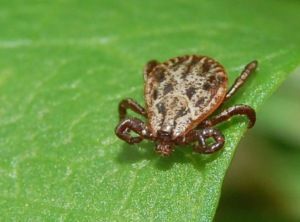News
Jackals bringing dangerous ticks to Denmark
This article is more than 8 years old.
Dermacentor reticulatus is a carrier of a rather unsavoury tick-borne bacteria

Tick another one off Denmark’s new species list (photo: Rainer Altenkamp)
Two years ago, it was confirmed that the European jackal had made its way to Denmark for the first time. But apparently, the canine species has brought a small, rather sinister passenger with it.
A recent autopsy of a dead jackal found in Denmark had no less than 21 ‘dermacentor reticulatus’ ticks on its body, 18 of which were carriers of rickettsia raoultii, a tick-borne bacteria that can make humans ill.
It’s the first time that the type of tick (and associated bacteria) – dubbed the meadow tick because it prefers open fields and meadows to woodlands – has been seen in Denmark,
The Technical University of Denmark (DTU) highlights the need for migrating predators, such as the jackal, to be considered part of a risk-analysis of illnesses in the country.
“The new wave of wolves and jackals that migrate across large distances in the EU means the problems currently seen in eastern Europe could turn up here in a short period of time,” René Bødker, an epidemiologist with the National Veterinary Institute at DTU, told DR Nyheder.
“The tick hangs on between the time the predator leaves the Czech Republic and arrives in Denmark. And that’s a new mechanism we haven’t seen before.”
READ MORE: European jackal found in Denmark
Jackal of all trades
Both the males and females of the new tick – dubbed the meadow tick because it prefers open fields and meadows to woodlands – bite, compared to only the female of the wood tick, which is native to Denmark.
When humans are bitten and infected with the bacteria (rickettsia raoultii), it can lead to disturbances of the lymphatic system and a black tissue scarring roughly the size of a five kroner coin.
Fortunately, the bacteria is easily treatable and Danish hospitals see it from time to time – primarily from people who have been nature hiking in Africa.
But health officials need to be aware that a tick bite can now stem from a new species and not just the wood tick, which can carry borrelia. Because while borrelia can be treated using penicillin or other antibiotics, that doesn’t work against rickettsia raoultii, which is an inter-cellular bacteria that requires a different type of antibiotic.
“These ticks and illnesses have probably been transferred to Denmark before, but the environment means they haven’t really been able to establish themselves here. But we now see that the ticks are gaining a foothold in the Netherlands and the UK,” said Bødker.
READ MORE: Live wild jackal spotted in northern Jutland
Be tick aware
The meadow tick can also transfer a deadly tick-borne illness to dogs via the babesia canis parasite.
The meadow ticks found on the jackal were all males as the females fall off when they mate. Researchers believe there were probably around 21 females on the jackal at some point too, which have fallen off somewhere in Denmark or on the journey and laid 7,000 eggs.
”Generally speaking, it’s now essential that everyone – particularly the country’s vets, hunters and others who are often in contact with farm animals and wildlife – is aware of this new tick species, so we can discover if it starts gaining a foothold in Denmark,” said Bødker.
The findings have just been published in the scientific journal Emerging Infectious Diseases.










































